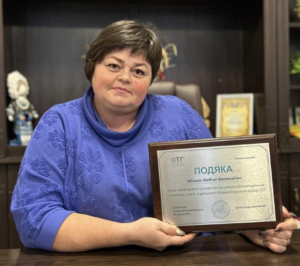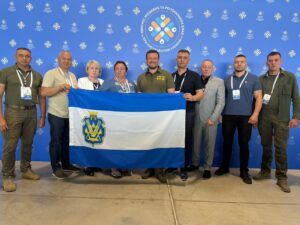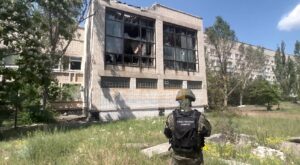Heads of 15 local military administrations in Kherson region closed an access to their asset declarations for 2024 and previous years. It is almost one third of people within this group of public officials.
Earlier the Center for Journalist Investigations (CJI) analyzed why deputies of Kherson Oblast Council closed an access to their declarations. Now we look at respective behavior of heads of military administrations in the region, created after full scale Russian invasion into Ukraine. But let us first examine legislative grounds and procedure for closing such an access.
Restricted access to public asset declarations – what does NACP say?
The National Agency on Corruption Prevention (NACP) restricted free access to the online Register of public asset declarations of governmental officials and officials of local self-government (hereinafter referred as the Register) on the first day of full scale Russian invasion in Ukraine. On March 4, 2022, Verkhovna Rada of Ukraine approved the law postponing mandatory submission of public asset declarations for the period of the martial law. But public officials could do it by their own will.
Under the public pressure, Verkhovna Rada renewed free open access to the Register and public asset declarations in September 2023. A number of groups were allowed to restrict an open access to their declarations: military personnel, members of police special forces participating in combat operations, intelligence personnel, public officials residing on occupied territories or performing their duties near the frontline. Public officials who are members of families of above mentioned groups are also allowed to close an open access to their declarations.
It should be noted that this list of exceptions does not include heads of local military administrations who perform their military service at these positions or are dispatched to these positions. It means that they are not allowed to close an access to their declarations as military personnel.
As the CJI found out, some public officials in Kherson region «expanded» the legislative list of exceptions by their own will. For example, if they have immovable assets on occupied territories or near the frontline, they treat it as the reason to close an open access to their asset declarations. As some members of local councils in Kherson region explained to the author of this article, they were afraid that Russian occupants would identify and loot or destroy their assets.
Their explanation seems to be an obvious manipulation because real addresses of immovable property of public officials have been always inaccessible and closed in the Register. More to that, local collaborators know very well real addresses of houses, apartments, land plots or businesses of Ukrainian public officials. There were numerous cases when they were looted.
Besides that, NACP clearly stipulated almost two years ago that the presence of assets and relatives on temporary occupied territories was not a legitimate reason to close an access to declarations. There is one exception to this rule: if direct members of families of public officials (spouses, minors, parents) are residing on occupied territories and were included into previous declarations. If they were not mentioned as family members in 2021-2023 declarations, then, there were no grounds to close an access to declarations.

Marathon to support occupied communities, Odesa, September 2025. Photo: Kherson Oblast State Administration
What is the procedure to close an access to public asset declarations? Public official submits written application to the head or deputy head of governmental body or local self-government body where he or she works. The head \ deputy head addresses the NACP. The Agency does not examine the validity of reasons to close an access to declarations. It is a sole responsibility of heads and their deputies. The Agency can reject these applications on formal grounds (for example, if an application is not signed or stamped). The procedure is laid down in the special Order of NACP about closing public access to declarations.
At the same time, NACP does not collect or analyze statistical data about received, satisfied or rejected applications about closing public access to declarations, as the CJI was told by Yulia Novikova, the head of unit for consideration of applications and access to public information at the department on issues of declarations and conflicts of interest of NACP.

Heads of military administrations of Beryslav raion, October 2025. Photo: Beryslav Raion Military Administration
Who pays salary to heads of military administrations?
Military administrations are temporary bodies of executive power for the period of martial law. Genichesk City Military Administration has been the first local military administration (hereinafter referred as MA) in Kherson region. It has been introduced on June 3, 2022 by the order of President of Ukraine Volodymyr Zelenskyy.
49 military administrations in Kherson region have been headed by heads of local communities, elected before the Russian invasion, public officials proposed by Kherson Oblast State Administration or army officers, proposed by the General Staff of the Armed Forces of Ukraine.
Until recently, these army officers received their salaries from the Ministry of Defence of Ukraine. We know that there were, at least, five heads of MA in 2024, proposed by the General Staff of the Armed Forces of Ukraine, including Roman Mrochko, then-head of Kherson MA.
Since May 12, 2025, heads of MA, recruited from army officers, have received their salaries from their military administrations. In his answer to our request, Valerii Melnychenko, Head of Vynogradivska Village MA of Kherson raion, referred to the order of the Cabinet of Ministries from May 9, 2025 regulating this issue.
Melnychenko is the only head of local MA from army officers with closed access to public asset declaration. Declarations of his current or former colleagues from army officers have been accessible in the Register. They include already mentioned Roman Mrochko, previous Head of Kherson City MA, Sergii Kukhta, Head of Skadovsk City MA, Oleksii Batkalov, Head of Bekhterska Village MA of Skadovsk raion, and Mykola Yatsenko, Head of Tyagyne Village MA of Beryslav raion.

Valerii Melnychenko (in the center), Chernivtsi, April 2025. Photo: Kherson Raion Military Administration
Who «closed» their declarations?
Heads of 15 from 49 military administrations in Kherson region closed an access to their public asset declarations. They have headed communities on occupied Left Bank territories as well as de-occupied communities on the Right Bank under current heavy shelling of Russian troops.
They first group (occupied territories) include Vitalii Kryvchyk, Head of Nyzhnyosirogozka Village MA, Viktor Debely, Head of Ivanivka Village MA (he has been recently suspected in extorting money from his subordinates), and Sergii Peretyatko, Head of Novotroitska Village MA. All these communities are located in occupied Genichesk raion.

Viktor Debely (right), August 2025. Photo: Facebook/Віктор Дебелий
The following heads with «closed» access to their declarations come from occupied Kakhovka raion: Vyacheslav Myroshnychenko, Head of Chaplynka Village MA, Vitalii Nemerets, Head of Kakhovka City MA, Yevhen Poznyak, Head of Zelenopidska Village MA, Artur Davydov, Head of Verkhnyorogachytska Village MA, and Tetyana Yuschenko, Head of Tavychanska Village MA.
There is no access to the declaration of Valerii Brusenskyy, recently dismissed Head of Nova Kakhovka City MA. At the same time, declarations of Oleg Tarabaka, his former First Deputy and current Head of Nova Kakhovka City MA, are accessible.
An access is closed to the declaration of Svitlana Linnyk, Head of Gola Prystan City MA from occupied Skadovsk raion and declaration of Oleksandr Levechko, Head of Novooleksandrivka Village MA, from occupied Beryslav raion,
Besides above mentioned Valerii Melnychenko, heads of MA with closed access to declarations include Oleksandr Babutsky, Head of Stanislav Village MA, Ihor Dudar, Head of Chornobaivka Village MA, and Ihor Ostrivny, Head of Bilozerka Village MA.
It is important to emphasize the following. Heads of all military administrations, created in occupied communities, work from the territory under the control of the Ukrainian government. Some of them are not residing on territories of Kherson region liberated from Russian occupants.
For example, Vitalii Nemerets, Head of Kakhovka City MA, often visits Kyiv and Kyiv Center for Support of refugees (internally displaced persons) from Kherson region. This Center hosts several dozens of employees of Ukrainian military administrations and local councils from occupied Kakhovka, Tavrychanske and Kalanchak communities.
Heads of other local military administrations of occupied communities are «dispersed» in other communities and regions of Ukraine.

Representatives of Tavrychansky village military administration at festival of borscht in Khmelnytsky oblast, September 2025. Photo: Kherson Oblast State Administration
«I have nothing to hide from people»
Surveyed heads of local military administrations confirm that they closed an access to their declarations or declarations of their subordinates because their family members are residing on occupied territories or near the frontline. However, there are people who follow another path.
Mykola Rizak, Head of Tavriiska City MA (abducted by Russian occupants in spring 2022), argued that he did not even think about closing an access to his asset declaration. No employees from his administration closed an access to their declarations, too.
«Honestly speaking, I do not want to waste my time on this matter. I understand those who have relatives on occupied territories. They are afraid. I have nothing to be afraid of. I lost everything I had. Everybody knows my life. I have nothing to hide from people», as Mykola Rizak told us.

Mykola Rizak (right), Head of Tavriiska City Military Administration, August 2025. Photo: Tavriiska City Military Administration
Iryna Goncharova, Secretary of Kakhovka City Council, did not close an access to her declaration though she owns some assets on occupied territory.
«When Russian occupants seized our city, they knew very well where I resided. In 2022, they abducted me and detained in the torture chamber. That is why I do not see any sense in hiding my declaration because I have a house or an apartment on occupied territory. Public part of my declaration has always closed information about my address but occupants knew it. After my escape from occupied territory, I have kept working as public official. My work should be transparent. I am not going to close an access to my declaration», as Iryna Goncharova told us.
Let us summarize. Practical use of legislation allows closing an access to public asset declarations under almost any reason. Relevant decisions have been taken by heads of governmental bodies and local self-government bodies. NACP does not examine validity of these decisions and reasons behind them. No governmental body examines the expiry of reasons to close an access. That is why full access to asset declarations of public officials will be restored only after the end of the war and termination of martial law.
At the same time, information about salaries of governmental officials and officials of local self-government, including heads of military administrations, remains «public» as officials receive their salaries from the state budget. As part 5 of article 6 of the Law of Ukraine «About an Access to Public Information» says, an access to such information cannot be restricted. This law or its separate norms has not been cancelled, suspended or restricted for the period of the martial law.
The CJI submitted information requests to heads of local military administrations in Kherson region who closed an access to their declarations. Our next material will show rating of revenues of these public officials.
This material was written within project of IWPR «Strengthening Civic Control» under financial assistance of Norway.





